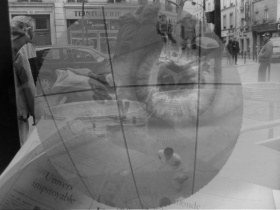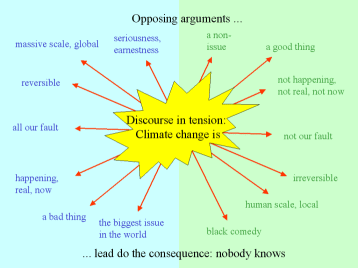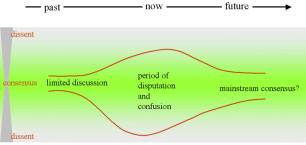 > ACCENT en > Special: Oct. 2006 Communication > R: Warm words
> ACCENT en > Special: Oct. 2006 Communication > R: Warm words
|
Warm WordsA study how climate change is communicated
|
|
Climate change is one of the greatest challenges facing mankind this century. It has many impacts on our environment, economy, energy supply and society. No one will remain immune from the consequences of climate change and this issue is being discussed more than ever before. Nevertheless, you, the citizen, student, non-scientist and reader of information, often get a rather diffuse image of what is really going on. Why is this? |
Climate change is a fact. If an apple tree loses one of his ripe apples, it will fall down to the Earth because of the force of gravity. However, the climate system follows much more complex laws than the apple. Therefore, the extent and character of climate change is discussed and we have to accept that there are uncertainties. Furthermore, the conditions for climate change have been influenced, are influenced and will be influenced by humans and nature. |
|
|
Since the future behaviour of you and all other humans is an unknown for scientists, the exact behaviour of the climate system cannot be predicted in the long term even if all the laws of nature were known. Consequently, climate change also depends on how it is communicated to you and all other people and how we all react to this. |
|
Does the information you get have an influence on your behaviour? Or does the language of communication fail to connect with popular imagination and consciousness?
The Institute for Public Policy Research in United Kingdom studied about 600 articles from the daily and weekly press, 40 television and radio advertisements and news clips, 30 press advertisements and analysed 20 websites. They investigated the language used and estimated the potential impact on mass audiences. |
Climate change discourse in the UK looks confusing, contradictory and chaotic. For every argument there is a voice declaring its opposite. It seems that climate change is not taken for granted and that the overarching message for the lay public is that nobody really knows. ( Do you agree with this? ) |
|
|
A discourse in tension In the past, the situation was once clearer. Climate change was discussed by a minority, but with a larger degree of certainty and conviction. As the debate entered the mainstream in the 1990s, opposing views and convictions were developed. |
|
We may ask if this is a surprise. If we are surrounded by sweets we like, listening to the more and more urgent advice of the dentist wouldn’t we try to find arguments which help us to keep some pleasures in life we would not like to give up? And would there not be a lobby of the sweets industry which does the same and stimulates our desire with advertisements? However, since the scientific evidence is growing and our non-reaction in the past continuously increases the pressure to do something in the future, we may come closer to the point of the mainstream opinion: We have this problem! We need to do something! |
|
Three main ways of communication If people have to be convinced, how are they addressed? The IPPR analysis found three dominating types of linguistic repertoires:
|
|
Alarmism The alarmist repertoire speaks to us with an urgent tone and cinematic codes as in disaster films: “We are all going to die!”. It employs a quasi-religious register of doom, death, judgement, using words such as “catastrophe”, “chaos” and “havoc”. It allows no complexity or middle ground, because it is simply extreme. Climate change shown in this way appears awesome, terrible, immense and beyond human control. Such descriptions are found everywhere, from the "Stop Climate Chaos" website to governmental information material. |
|
|
|
Optimism, nihilism and scepticism “What’s all the fuss about?” could be the leading question of this linguistic repertoire. It is effectively a refusal to engage in the debate, appearing in several variations. One of them is the ignoring optimism: “Don’t worry so much, it will be alright.” It is often linked with settlerdom. The term "settlers" stands for people who like to look backward to the good old days and dislike anything new or different which could threaten their identity, belonging and security. Settlerdom rejects and mocks the alarmist discourse. It is estimated that about 21% of the British behave in this way. The problem is that they are immune to scientific arguments and regard their position as common sense. |
However, arguing superficially the sceptics can be easily attacked themselves. But there is a grey zone to expert denial, an ongoing discussion of persons with scientific background arguing that climate change is caused predominantly by natural processes. But the level is so high that the expected audience are mainly other scientists.
|
|
|
It’s not worth destroying the free market for climate change prevention. Or … another group sees climate change with optimism. It might be potentially beneficial. The contradicting statements of alarmism and refusal of dangers make the discourse rather confusing and chaotic for the readers and viewers. |
|
Minor action But, besides alarmism and more than refusal, optimistic pragmatism is leading in the debate. The overall motto could be: “It will be alright when we do something.” There are several variations of this optimism. One is that technology will provide an answer. It gives the impression that everything is just a question of progress. Another one is the optimism of radical heroism: a small number of people are doing large things. |
|
But often the advocates of extreme action are dismissed as “long-haired hippies out to change the world”. More convenient for daily life seems the pragmatism: I am doing my bit for the planet. The motivation is based on a mixture of ethics and self-interest. (Saving fuel saves money.) Minor action normalises the discourse of alarmism, but can also easily end up in the too boring and ignorable. It can easily lack the energy to really make an impact. |
|
What can be improved? It is not enough to produce just more messages based on rational argument and top-down persuasion. Other techniques of engagement are necessary. Heroism Convenience Esteem Climate-friendly actions need to be made to feel attractive and compelling in terms that make sense to people today. This leads us to treat climate-change communications in the same way as brand communications: we have to approach positive climate behaviours in the same way as marketeers approach acts of buying and consuming.
|







